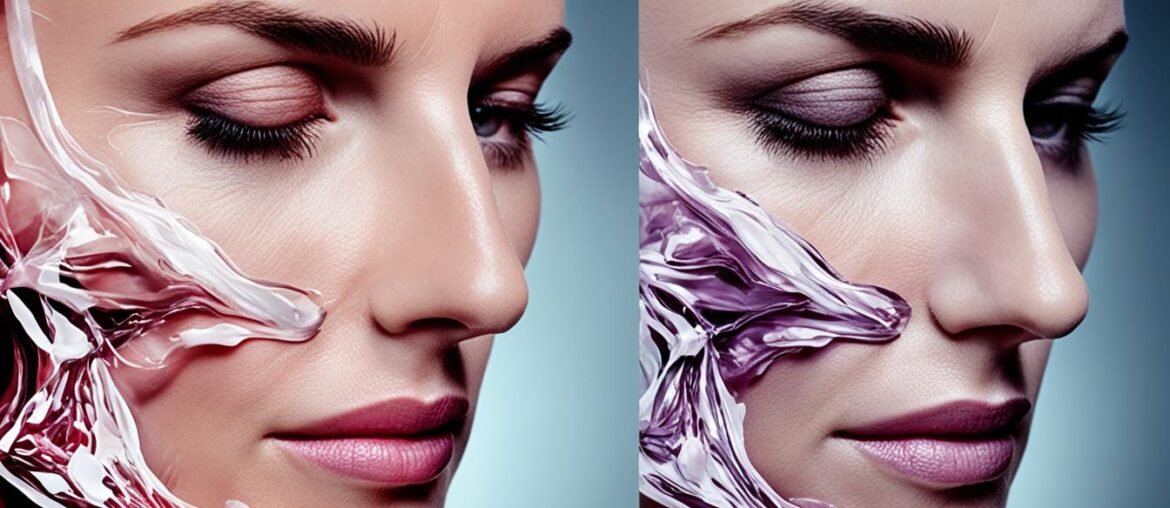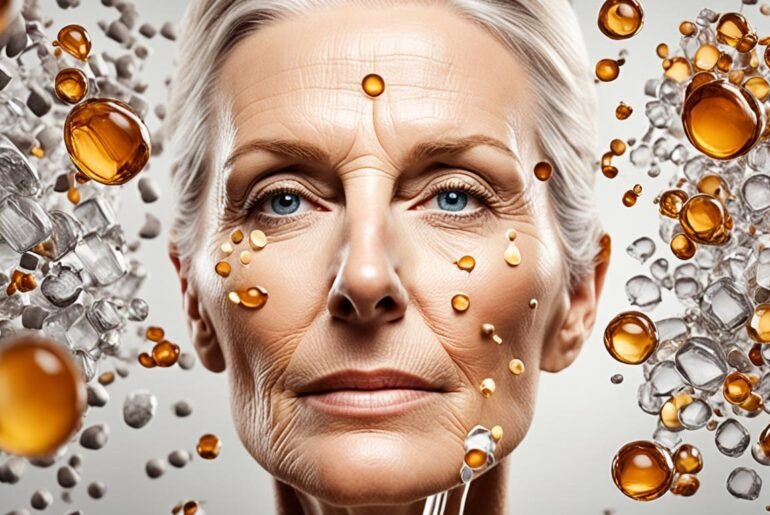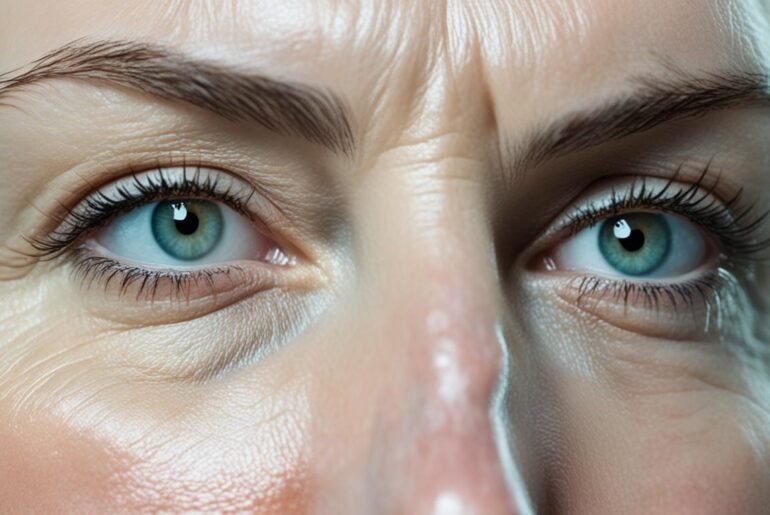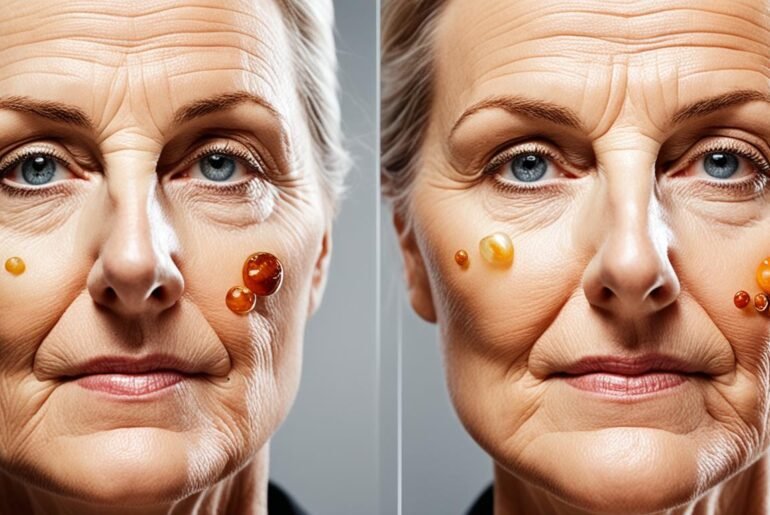Did you know that alcohol consumption can have a profound influence on collagen production in the body? Collagen, the protein responsible for maintaining skin elasticity and youthfulness, can be significantly affected by alcohol consumption. This unexpected fact highlights the importance of understanding the effects of alcohol on collagen synthesis and its potential contribution to skin aging.
Multiple studies have investigated the relationship between alcohol and collagen production, revealing alarming results. Excessive alcohol consumption can lead to a decrease in collagen production, resulting in weakened skin resilience and an increased likelihood of wrinkles and sagging skin.
This eye-opening statistic serves as a call to action, urging individuals to reconsider their alcohol consumption habits and prioritize the health of their skin. In the following sections, we will delve deeper into the link between alcohol consumption and facial aging, the effects of alcohol on collagen production, and the impact of alcohol-induced dehydration on the skin. Understanding these connections can empower you to make informed choices for healthier and more youthful-looking skin.
Key Takeaways:
- Alcohol consumption can have a significant impact on collagen production, a key protein for maintaining skin elasticity.
- Excessive alcohol consumption can lead to a decrease in collagen production and contribute to premature skin aging.
- Understanding the effects of alcohol on collagen synthesis and skin health can guide individuals towards more informed choices.
- Reducing alcohol consumption and embracing healthier habits can support collagen production and improve skin resilience.
- Moderating alcohol intake and adopting a balanced lifestyle can contribute to healthier and more youthful-looking skin.
The Link Between Alcohol Consumption and Facial Aging
A large multinational study examined the association between facial aging and smoking or alcohol consumption in women. The study found that smoking was associated with the increased severity of forehead lines, crow’s feet, glabellar lines, under-eye puffiness, tear-trough hollowing, nasolabial folds, oral commissures, perioral lines, and reduced lip fullness. Heavy alcohol use (≥8 drinks/week) was associated with increased upper facial lines, under-eye puffiness, oral commissures, midface volume loss, and visible blood vessels. These findings suggest that both smoking and alcohol consumption significantly impact skin and volume-related facial aging.
| Effect | Smoking | Alcohol Consumption |
|---|---|---|
| Forehead lines | Increased severity | — |
| Crow’s feet | Increased severity | — |
| Glabellar lines | Increased severity | — |
| Under-eye puffiness | Increased severity | Increased |
| Tear-trough hollowing | Increased severity | — |
| Nasolabial folds | Increased severity | — |
| Oral commissures | Increased severity | Increased |
| Perioral lines | Increased severity | — |
| Lip fullness | Reduced | — |
| Upper facial lines | — | Increased |
| Midface volume loss | — | Increased |
| Visible blood vessels | — | Increased |
Alcohol’s Effect on Collagen Production
Alcohol consumption can have a profound impact on the production of collagen, a critical protein responsible for providing strength and elasticity to the skin. Scientific studies have shown that alcohol disrupts the synthesis of collagen while simultaneously increasing collagen degradation, ultimately resulting in weakened and less resilient skin. This detrimental effect on collagen production can lead to the formation of wrinkles, sagging skin, and a decrease in overall skin elasticity.
Research has demonstrated that alcohol inhibits the synthesis of collagen, impairing the body’s ability to produce new collagen fibers. Additionally, alcohol promotes collagen degradation by activating specific enzymes that break down collagen molecules. As a result, the skin loses its natural support structure, leading to visible signs of aging and decreased skin firmness.
This disruption of collagen production and degradation can have a significant impact on the overall health and appearance of the skin. The loss of collagen fibers weakens the skin’s ability to retain moisture, resulting in dryness and a lack of elasticity. Over time, this can contribute to the formation of fine lines, wrinkles, and sagging skin.
In addition to the direct effect on collagen synthesis and degradation, alcohol consumption can also disrupt other essential processes that contribute to skin health. Alcohol can impair the body’s absorption of vital nutrients necessary for collagen production, such as vitamin C and zinc. Furthermore, excessive alcohol intake can lead to dehydration, further exacerbating skin dryness and accelerating the aging process.
It is important to note that the harmful effects of alcohol on collagen production and skin elasticity are dose-dependent and can vary among individuals. However, reducing alcohol consumption or avoiding excessive alcohol intake may help mitigate these effects and promote healthier, more youthful-looking skin.
Dehydration and Skin Aging
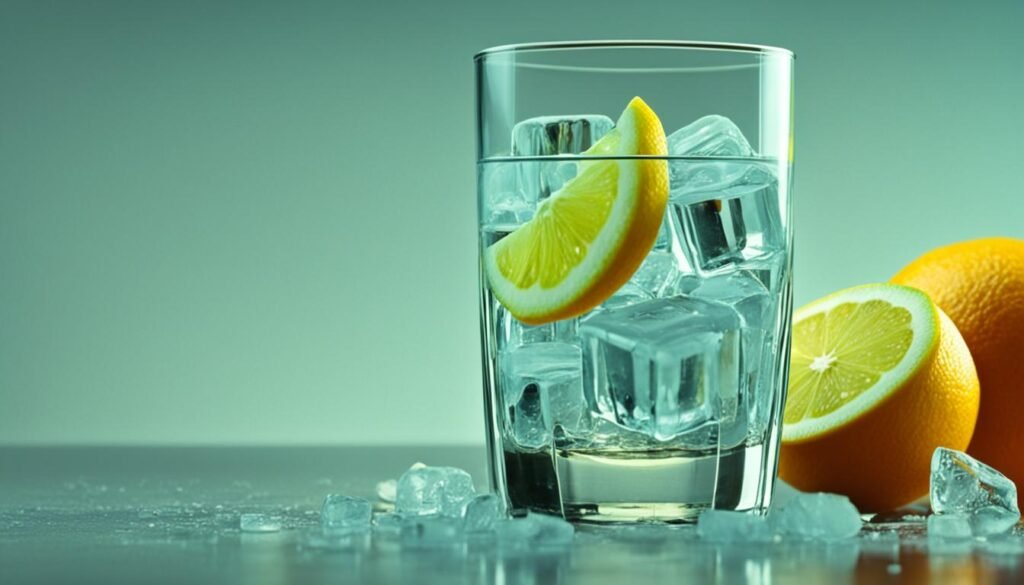
One of the negative effects of alcohol consumption is alcohol-induced dehydration. Alcohol acts as a diuretic, increasing urination and leading to fluid loss from the body. Dehydration can have detrimental effects on the skin, contributing to dryness, sagging, the formation of wrinkles, and the appearance of sunken eyes.
When the body lacks proper hydration, the skin loses its natural moisture, resulting in dryness and a dull complexion. Dehydrated skin is also more prone to sagging, as it loses its elasticity and firmness. This can lead to the formation of wrinkles and fine lines, giving the skin an aged appearance.
In addition, dehydration can cause the eyes to appear sunken and hollow. Lack of hydration affects the delicate skin around the eyes, making it more susceptible to thinning and sagging.
Regular and excessive alcohol consumption can exacerbate these symptoms and accelerate the aging process of the skin. Therefore, it is crucial to stay hydrated by drinking plenty of water and reducing alcohol intake to maintain the health and vitality of the skin.
The Impact of Alcohol on Skin Dehydration
Alcohol-induced dehydration is primarily caused by its diuretic effects. As alcohol enters the body, it affects the production of vasopressin, a hormone that regulates fluid balance. When vasopressin levels are disrupted, the kidneys produce more urine, leading to increased fluid loss.
Additionally, alcohol can increase perspiration and decrease the body’s ability to retain water, further contributing to dehydration. These effects can be intensified when alcohol is consumed in large quantities or over a prolonged period.
To counteract the dehydrating effects of alcohol, it is essential to prioritize hydration. Apart from reducing alcohol consumption, drinking an adequate amount of water throughout the day can help replenish lost fluids and maintain optimal skin hydration.
Alcohol-Induced Inflammation and Facial Redness
Alcohol consumption can trigger inflammation in the body, including the skin, resulting in facial redness and flushing. This inflammatory response is often accompanied by a histamine reaction, especially in individuals who have alcohol intolerance. These histamine reactions can further exacerbate skin redness and flushing, leading to discomfort and visible signs of inflammation.
In some cases, regular alcohol consumption can contribute to the development of rosacea, a chronic skin condition characterized by persistent facial redness, broken blood vessels, and increased skin sensitivity. Rosacea can be exacerbated by alcohol-induced inflammation, making it important for individuals with rosacea to be mindful of their alcohol consumption to minimize flare-ups and manage their symptoms effectively.
The Role of Histamine in Alcohol-Induced Facial Redness
When alcohol is metabolized in the body, it can trigger the release of histamine, a compound involved in immune responses. In individuals who have an intolerance to alcohol or who lack the enzyme necessary to break down alcohol efficiently, histamine levels can rapidly increase, leading to facial redness and flushing. This reaction is commonly known as alcohol-induced facial flushing or alcohol flush reaction.
Alcohol-induced facial flushing occurs predominantly among individuals of East Asian descent who possess a genetic variation that reduces their ability to metabolize alcohol effectively. This genetic difference results in a buildup of acetaldehyde, a toxic byproduct of alcohol metabolism, leading to an exaggerated histamine release and subsequent facial redness and flushing.
It’s important to note that alcohol-induced facial flushing is not exclusive to individuals of East Asian descent. It can occur in individuals from various ethnic backgrounds, especially those with a genetic predisposition to histamine reactions.
Managing Alcohol-Induced Facial Redness and Inflammation
To minimize alcohol-induced facial redness and inflammation, individuals can take the following measures:
- Avoid or limit alcohol consumption: By reducing alcohol intake, individuals can help prevent or mitigate the histamine reaction and subsequent facial redness.
- Stay hydrated: Alcohol can dehydrate the body and exacerbate skin inflammation. Drinking plenty of water and staying hydrated can help reduce the intensity of facial redness and flushing.
- Modify skincare routine: Using gentle, soothing skincare products can help calm the skin and alleviate inflammation caused by alcohol-induced flushing.
Considering that alcohol-induced inflammation can significantly impact skin health, it’s crucial for individuals experiencing persistent facial redness or other skin issues to consult a dermatologist for a comprehensive evaluation and customized treatment plan.
Alcohol and Liver Disease

Heavy and consistent alcohol consumption can have detrimental effects on liver health, potentially leading to liver disease. One of the visible manifestations of liver disease is jaundice, which is characterized by the yellowing of the skin and eyes. Jaundice occurs due to the buildup of bilirubin, a yellow pigment, in the body when the liver fails to adequately process it.
Juandice is a sign of liver damage and can indicate serious health issues, such as hepatitis, cirrhosis, or liver cancer. When the liver is unable to function properly, it fails to filter bilirubin, resulting in its accumulation in the bloodstream, leading to the yellowing of the skin and eyes.
If you notice any changes in your skin color, particularly the onset of a yellow tint in your skin or the whites of your eyes, it is crucial to seek immediate medical attention to assess liver function and address potential liver disease.
The Impact of Liver Disease on Overall Health
Liver disease, if left untreated, can have severe consequences for overall health. The liver plays a vital role in various bodily functions such as filtering toxins from the blood, producing essential proteins, and metabolizing nutrients. When the liver is compromised, these functions are impaired, negatively affecting the body’s overall health and well-being.
Furthermore, liver disease can lead to complications such as fluid retention, bleeding disorders, malnutrition, and a weakened immune system, increasing the risk of infections.
| Common Types of Liver Disease | Causes | Symptoms |
|---|---|---|
| Hepatitis | Viral infections (Hepatitis A, B, and C), alcohol abuse, autoimmune diseases | Fatigue, jaundice, loss of appetite, nausea, abdominal pain |
| Cirrhosis | Chronic alcohol abuse, hepatitis, fatty liver disease, certain medications | Fatigue, jaundice, fluid retention, easy bruising, bleeding, mental confusion |
| Liver Cancer | Chronic hepatitis B or C infection, cirrhosis, heavy alcohol consumption, obesity | Unexplained weight loss, abdominal pain, jaundice, swelling in the abdomen |
It is essential to take liver health seriously and make necessary lifestyle changes, such as reducing alcohol consumption and adopting a balanced diet, to prevent liver disease and maintain overall well-being.
The Impact of Alcohol on DNA and Aging
Recent research has highlighted the potential detrimental effects of alcohol consumption on DNA integrity and the aging process. This section explores how alcohol can damage DNA, specifically in telomeres, and the implications this has on biological aging.
Under normal circumstances, telomeres, which are protective DNA sequences found at the ends of chromosomes, naturally shorten over time as a result of cell division. This shortening process is a hallmark of biological aging. However, alcohol consumption has been shown to accelerate this shortening, leading to premature aging at a cellular level.
Studies have demonstrated that alcohol-induced DNA damage in telomeres can have far-reaching consequences. Telomere dysfunction has been linked to an increased risk of age-related diseases, including cancer, coronary artery disease, and Alzheimer’s. The shortening of telomeres is associated with a decline in overall cellular function and can contribute to the aging process.
Alcohol’s impact on telomeres is believed to be mediated through various mechanisms, including oxidative stress and inflammation. The consumption of alcohol generates reactive oxygen species that can directly damage DNA, compromising the stability of telomeres. Furthermore, alcohol-induced inflammation can exacerbate telomere shortening by promoting cellular stress and DNA damage.
To illustrate the impact of alcohol on telomere length and biological aging, here is an example of a comparative study:
| Study Group | Alcohol Consumption | Telomere Length |
|---|---|---|
| Group A | Non-drinkers | 1.4x average telomere length |
| Group B | Moderate alcohol consumption (1-2 drinks/day) | 1.1x average telomere length |
| Group C | Heavy alcohol consumption (3 or more drinks/day) | 0.9x average telomere length |
This hypothetical study demonstrates a clear correlation between alcohol consumption and telomere length. Non-drinkers have the longest telomeres, while heavy alcohol consumers have significantly shorter telomeres, indicative of accelerated biological aging.
It is important to note that the impact of alcohol on DNA and telomeres is complex and can be influenced by several factors, such as the duration and intensity of alcohol consumption, individual genetic predisposition, and overall lifestyle choices. However, evidence suggests that reducing alcohol intake or abstaining from alcohol altogether can promote telomere stability and potentially slow down the aging process at a cellular level.
The Benefits of Reducing Alcohol Consumption for Skin Health
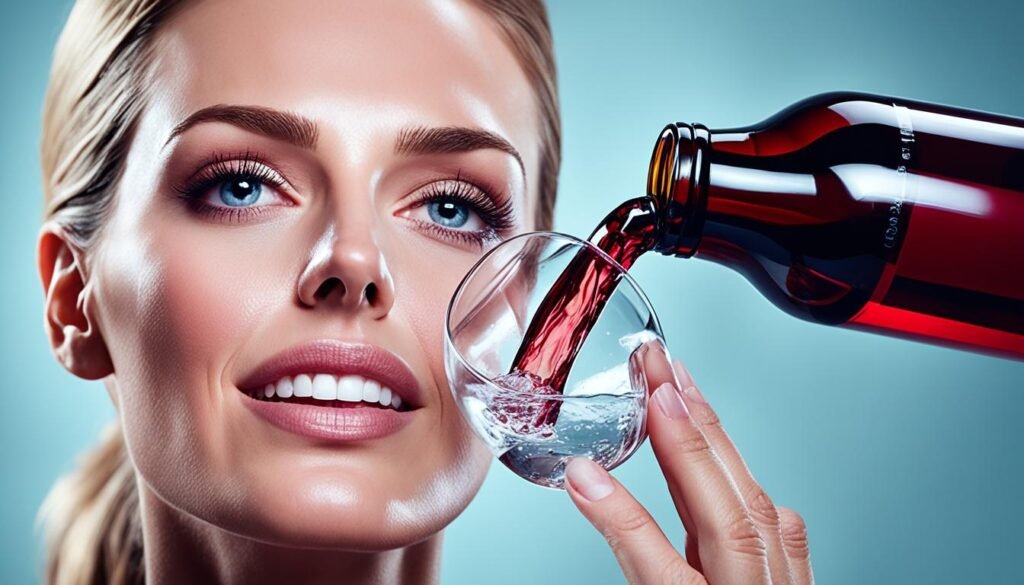
Reducing or eliminating alcohol consumption can have significant benefits for skin health. While some effects of alcohol on the skin may be irreversible, making changes in alcohol consumption habits can give the skin a chance to regenerate and improve overall health.
One of the key advantages of reducing alcohol intake is collagen regeneration. Collagen is a vital protein that provides strength and elasticity to the skin. Regular alcohol consumption can interfere with collagen production, leading to weakened skin structure, increased wrinkles, and decreased elasticity.
By cutting back on alcohol, the skin has the opportunity to restore and enhance collagen production, thereby improving skin elasticity and reducing the signs of aging.
Another benefit of reducing alcohol consumption is improved hydration. Alcohol is a diuretic, causing the body to lose fluids and dehydrate the skin. Proper hydration is essential for maintaining healthy skin as it helps to plump the skin, reduce dryness, and minimize the appearance of wrinkles.
By drinking plenty of water and avoiding excessive alcohol consumption, individuals can counteract the dehydrating effects of alcohol and promote optimal skin hydration.
| Benefits of Reducing Alcohol Consumption for Skin Health |
|---|
| 1. Improved collagen regeneration |
| 2. Enhanced skin elasticity |
| 3. Reduced appearance of wrinkles |
| 4. Increased skin hydration |
| 5. Minimized dryness and flakiness |
Reducing alcohol consumption not only benefits skin health but also contributes to overall well-being. By adopting a balanced lifestyle and prioritizing hydration, individuals can support their skin’s natural rejuvenation processes and promote a healthier, more radiant complexion.
The Rise of Sober Curiosity and Skin Improvement
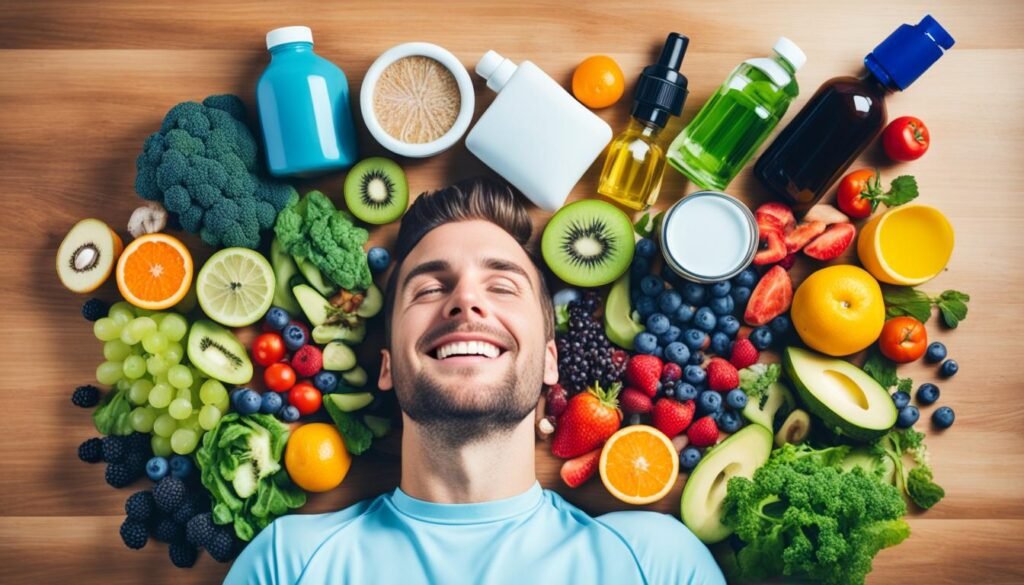
The trend of reducing alcohol consumption or embracing sober curiosity has gained popularity in recent years. Many individuals have reported improved skin health as one of the benefits of cutting back on alcohol. This shift in lifestyle choices and the focus on well-being has led to alternative options such as mocktails and non-alcoholic beverages, providing healthier choices for those looking to improve their skin.
Reducing alcohol consumption not only benefits overall health, but it can also have a positive impact on the skin. Alcohol can dehydrate the skin and disrupt collagen production, leading to dryness, wrinkles, and sagging. By reducing alcohol intake, the skin can retain more moisture, resulting in a healthier and more hydrated complexion.
The Benefits of Sober Curiosity for Skin Health:
- Improved skin hydration and moisture retention
- Reduced inflammation and facial redness
- Promotion of collagen synthesis for greater skin elasticity
- Prevention of premature skin aging and the formation of wrinkles
By embracing sober curiosity and reducing alcohol consumption, individuals can set themselves on a path to healthier skin. Alongside a skincare routine that includes gentle cleansing, moisturizing, and sun protection, cutting back on alcohol can significantly improve the overall appearance and quality of the skin.
“Reducing alcohol consumption has been a game-changer for my skin. Not only did I notice a decrease in redness and inflammation, but my skin also became more supple and vibrant. It’s amazing what a simple lifestyle change can do.” – Sarah, 34
Sober Curiosity Tips for Healthy Skin:
- Swap alcoholic beverages for mocktails or non-alcoholic alternatives.
- Stay hydrated by drinking plenty of water throughout the day.
- Incorporate skin-nourishing foods into your diet, such as fruits, vegetables, and omega-3 fatty acids.
- Practice self-care activities that promote relaxation and stress reduction, such as meditation or yoga.
- Seek support from community groups or online forums dedicated to sober curiosity.
Embracing sober curiosity is not only a positive step towards healthier skin but also an opportunity for personal growth and well-being. By prioritizing self-care and making conscious choices about alcohol consumption, individuals can enjoy the benefits of clearer, more radiant skin.
| Benefits of Sober Curiosity for Skin Health | |
|---|---|
| Improved skin hydration and moisture retention | |
| Reduced inflammation and facial redness | |
| Promotion of collagen synthesis for greater skin elasticity | |
| Prevention of premature skin aging and the formation of wrinkles |
Taking Care of Your Skin by Moderating Alcohol Consumption
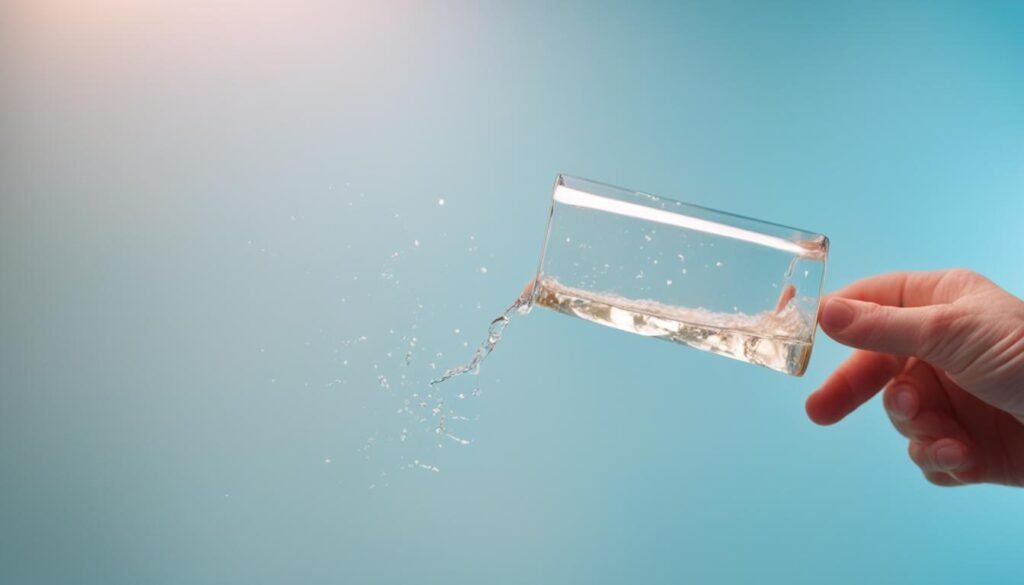
Taking care of your skin involves not only external care but also being mindful of internal factors such as alcohol consumption. Moderating alcohol intake and being aware of its potential negative effects can help minimize damage to the skin. Coupled with a healthy skincare routine, a balanced lifestyle that includes moderate alcohol consumption can contribute to maintaining healthy and youthful-looking skin.
The Impact of Alcohol Moderation on Skin Care
When it comes to skin care, striking a balance is key. While complete abstinence from alcohol is not necessary for everyone, moderation is essential to minimize potential negative effects. Excessive alcohol consumption can dehydrate the skin, disrupt collagen production, and lead to inflammation – all of which can contribute to premature aging and skin damage.
By moderating alcohol consumption, individuals can help mitigate these risks and maintain healthier skin. This involves being mindful of the quantity and frequency of alcohol consumption, as well as being aware of how it may interact with skincare products and routines.
Healthy Skincare Routine and Alcohol Moderation
Combining a healthy skincare routine with alcohol moderation can have a synergistic effect on skin health. A consistent skincare regimen, including cleansing, moisturizing, and protecting the skin from the sun, can help counteract some of the negative effects of alcohol on the skin.
Additionally, incorporating gentle exfoliation into the skincare routine can aid in removing dead skin cells and promoting cell turnover, resulting in a healthier complexion. However, it is important to avoid over-exfoliation, as this can cause irritation and compromise the skin’s barrier function.
Choosing Alcohol-Related Products Wisely
When selecting skincare products, it is important to consider the potential interactions between alcohol and the ingredients in these products. Some skincare formulations contain alcohol as a solvent or preservative. While low concentrations of alcohol may not pose significant risks, those with sensitive or dry skin may want to opt for alcohol-free alternatives.
Reading product labels and being aware of the ingredients can help individuals make informed choices when it comes to alcohol-related skincare products. Additionally, consulting with a dermatologist or skincare professional can provide valuable insights and personalized recommendations.
Minimizing Negative Effects of Alcohol on the Skin
To minimize the negative effects of alcohol on the skin, individuals can consider the following strategies:
- Stay hydrated: Drinking plenty of water can help counteract alcohol-induced dehydration and maintain skin moisture.
- Practice moderation: Limiting alcohol intake to moderate levels, as defined by reputable health organizations, can help reduce the risk of skin damage and premature aging.
- Take breaks: Periodically abstaining from alcohol can give the body and skin a chance to recover and regenerate.
By implementing these strategies and maintaining a balanced lifestyle that includes moderate alcohol consumption, individuals can take better care of their skin and support long-term skin health.
| Positive Effects | Negative Effects |
|---|---|
| Promotes relaxation | Dehydrates the skin |
| Moderate antioxidant properties | Disrupts collagen production |
| Can enhance social experiences | Increases inflammation |
| Moderate alcohol consumption may have cardiovascular benefits | May exacerbate skin conditions like rosacea |
The Role of Collagen in Skin Health
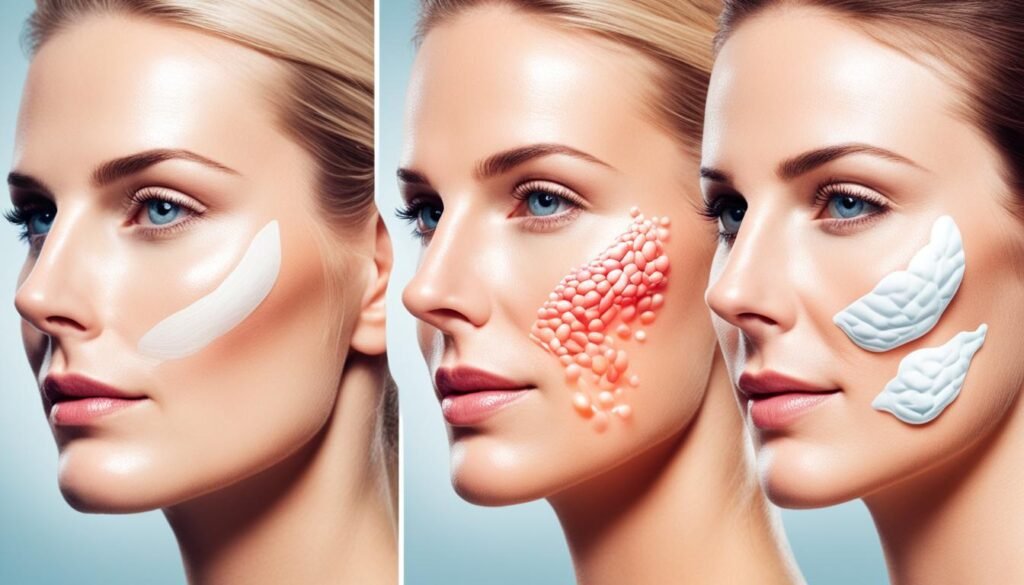
Collagen is a crucial component of skin health, providing structural support and elasticity. It is a protein that forms a framework for our skin, keeping it firm, smooth, and resilient. Collagen synthesis is a natural process that occurs in the body, but it can be affected by various factors, including age, lifestyle choices, and environmental factors.
As we age, collagen production naturally declines, resulting in the appearance of wrinkles, fine lines, and sagging skin. To maintain healthy and youthful-looking skin, it is essential to support collagen synthesis and production.
Reducing alcohol consumption is one way to support collagen production and overall skin health. Excessive alcohol consumption has been found to disrupt collagen synthesis and increase collagen degradation, leading to weakened and less resilient skin. By moderating alcohol intake and adopting a balanced lifestyle, individuals can minimize the negative effects of alcohol on collagen and skin health.
In addition to reducing alcohol consumption, there are other methods to support collagen synthesis and maintain optimal skin health:
- A balanced diet: Consuming foods rich in collagen-boosting nutrients, such as vitamin C, zinc, and copper, can support collagen synthesis. Incorporate foods like citrus fruits, berries, leafy greens, nuts, and lean proteins into your diet.
- Proper hydration: Staying hydrated is crucial for collagen production. Drink an adequate amount of water throughout the day to keep your skin hydrated and plump.
- Collagen supplements: Collagen supplements can provide an additional boost to collagen synthesis. They come in various forms, such as powders, capsules, and drinks. Consult with a healthcare professional before starting any supplements.
By taking these steps to support collagen production and overall skin health, you can maintain a youthful and radiant complexion.
Conclusion
The influence of alcohol on collagen production has significant implications for skin health and aging. Excessive alcohol consumption can lead to dehydration, inflammation, collagen disruption, and other negative effects that contribute to premature skin aging.
By reducing alcohol consumption and adopting a balanced lifestyle, individuals can support collagen production and maintain healthier and more youthful-looking skin. It is important to recognize the effects of alcohol on collagen synthesis and skin elasticity, and make informed choices to prioritize skin health.
Remember, alcohol-induced dehydration can contribute to skin dryness, sagging, and the formation of wrinkles. Additionally, alcohol-induced inflammation can lead to facial redness and flushing, potentially exacerbating conditions such as rosacea. Taking care of your skin involves not only external care but also being mindful of internal factors such as alcohol consumption.
By acknowledging the impact of alcohol on collagen production and skin health, and making conscious efforts to moderate alcohol consumption, individuals can minimize the negative effects on their skin and maintain a healthier complexion.
FAQ
What is the influence of alcohol on collagen production?
Alcohol can disrupt collagen synthesis and increase collagen degradation, leading to weakened skin, wrinkles, sagging, and decreased skin elasticity.
How does alcohol consumption affect facial aging?
Heavy alcohol use can contribute to upper facial lines, under-eye puffiness, oral commissures, midface volume loss, and visible blood vessels, which are signs of accelerated facial aging.
Does alcohol consumption cause dehydration and how does it affect the skin?
Yes, alcohol acts as a diuretic and can cause dehydration, resulting in skin dryness, sagging, the formation of wrinkles, and sunken eyes.
Can alcohol consumption cause inflammation and facial redness?
Yes, alcohol consumption can induce inflammation in the skin, leading to facial redness, flushing, and can contribute to the development of conditions such as rosacea.
What is the relationship between alcohol and liver disease?
Consistent alcohol consumption can lead to liver disease, which can manifest as jaundice – the yellowing of the skin and eyes.
How does alcohol impact DNA and aging?
Alcohol-induced DNA damage can accelerate the aging process by affecting telomeres, which are protective DNA sequences that shorten over time and contribute to biological aging.
Does reducing alcohol consumption benefit skin health?
Yes, reducing or eliminating alcohol consumption can improve collagen production and skin elasticity, especially when combined with proper hydration and a balanced lifestyle.
What is the relationship between alcohol reduction and improved skin?
Embracing sober curiosity or reducing alcohol consumption has been associated with improved skin health, as individuals report benefits such as clearer and healthier skin.
How can moderating alcohol consumption contribute to skin care?
Moderating alcohol intake, combined with a proper skincare routine, can help minimize the negative effects of alcohol on the skin and promote overall skin health.
What is the role of collagen in skin health?
Collagen is essential for maintaining skin health, providing structural support and elasticity. Supporting collagen synthesis through various methods can contribute to healthy and youthful-looking skin.
How does alcohol consumption affect collagen production?
Alcohol consumption can disrupt collagen synthesis and increase collagen degradation, leading to weakened skin and decreased skin elasticity.
Why is it important to understand the influence of alcohol on collagen production?
Understanding the impact of alcohol on collagen production is crucial for maintaining skin health and preventing premature skin aging.

